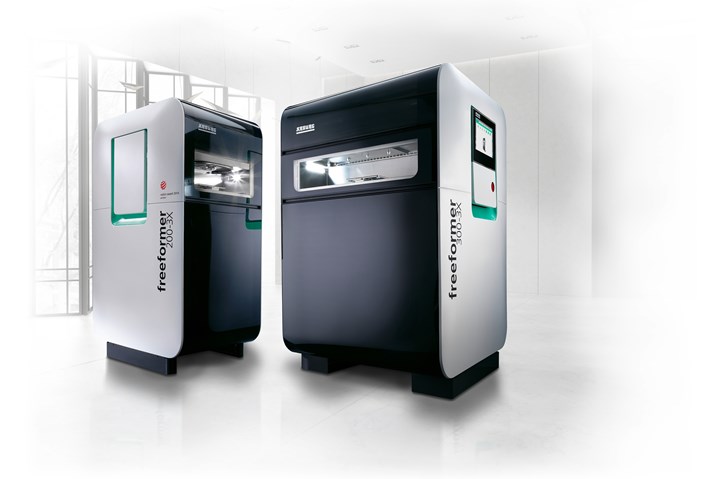Patented AM Process for Functional Multi-Component Parts Production
Arburg Freeformer and AFP process enables 3D plastic part build layer-by-layer with high material diversity and high part quality.

Photo Credit: Arburg
Showcased during the Formnext Connection 2020 international exhibition and conference, Arburg’s Freeformer, an open system for the additive manufacturing of functional parts, combined with the company’s patented Arburg Plastic Freeforming (APF) process, is said to redefine plastics processing and meet demanding parts. Potential applications include medical technology, the processing of soft materials and polypropylene (PP) and additive manufacturing of multi-component parts.
A special plasticizing screw melts the standard granulates in the same way as in injection molding. This is followed by freeforming without the use of a mold: a high-frequency, high-precision pulsed nozzle closure discharges tiny plastic droplets, which are applied precisely by means of a moving part carrier. No special processes or material additives are required in order to harden the plastic in the temperature-controlled build chamber; instead, the tiny droplets fuse with the surrounding material as they cool, enabling a layer-by-layer plastic part build. Further, the droplet size, layer thickness and process control can be influenced “freely” in a targeted manner.
With 200-3X and 300-3X systems offered, the freeformer system can be used to process standard granulates flexibly, including material diversity. For example, it does not require any prefabricated materials such as resin or powders. In addition to the familiar additive standard materials, original materials can also be processed, including semi-crystalline PP, biopolymers, flame-proof materials and medical-grade polylactide.
Further, AM parts produced via the AFK process almost retain the same properties as injection molded parts, particularly in relation to mechanical load-bearing capacity, recoil characteristics, UV stability and endurance strength. Slicing parameters also enable various material densities within the part.
Arburg says it has proven its AFK process technology and freeform open system via automotive parts, the production of a flexible shoe sole, absorbable implants and Resomer Composite LR 706 S ß-TCP, a product similar to human bone that promotes bone formation.
Arburg has integrated the Freeformer into the customer portal arburgXworld.
Related Content
-
Building Molds: Most Popular Reads of 2024
Dive into the most-viewed content for building your mold, including topics such as cutting tools, EDM, hot runners, additive manufacturing, mold materials, machining and mold components.
-
3D Printing Technologies for Moldmaking Applications
3D printing technologies, from conformal cooling to complex mold building, are making an impact on the moldmaking industry, one innovation at a time.
-
Mold Materials, 3D Printing Technologies for Next-Gen Moldmaking
As moldmaking advances, so too do the materials and processes involved in their efficient production, including these latest mold materials and 3D printing technologies.















